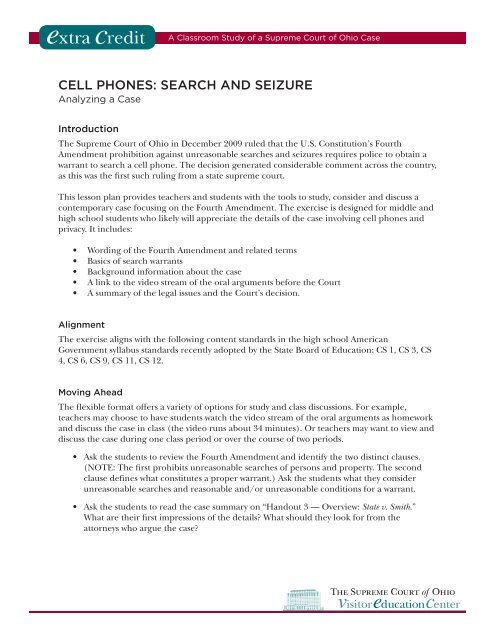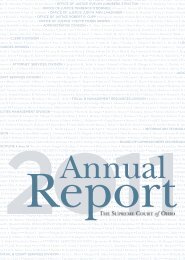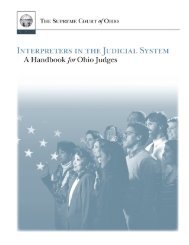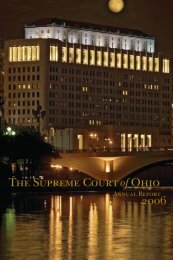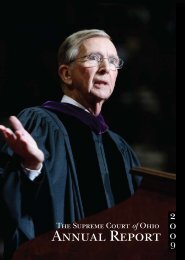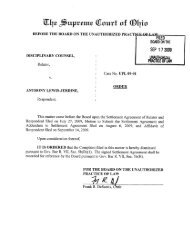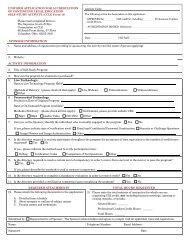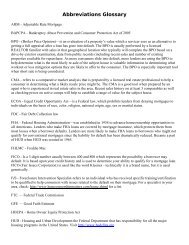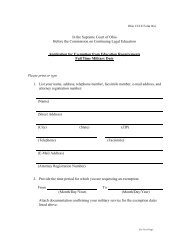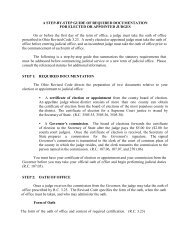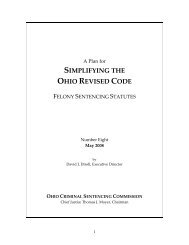cell phones: search and seizure - Supreme Court - State of Ohio
cell phones: search and seizure - Supreme Court - State of Ohio
cell phones: search and seizure - Supreme Court - State of Ohio
Create successful ePaper yourself
Turn your PDF publications into a flip-book with our unique Google optimized e-Paper software.
xtra redit A Classroom Study <strong>of</strong> a <strong>Supreme</strong> <strong>Court</strong> <strong>of</strong> <strong>Ohio</strong> Case<br />
CELL PHONES: SEARCH AND SEIZURE<br />
Analyzing a Case<br />
Introduction<br />
The <strong>Supreme</strong> <strong>Court</strong> <strong>of</strong> <strong>Ohio</strong> in December 2009 ruled that the U.S. Constitution’s Fourth<br />
Amendment prohibition against unreasonable <strong>search</strong>es <strong>and</strong> <strong>seizure</strong>s requires police to obtain a<br />
warrant to <strong>search</strong> a <strong>cell</strong> phone. The decision generated considerable comment across the country,<br />
as this was the first such ruling from a state supreme court.<br />
This lesson plan provides teachers <strong>and</strong> students with the tools to study, consider <strong>and</strong> discuss a<br />
contemporary case focusing on the Fourth Amendment. The exercise is designed for middle <strong>and</strong><br />
high school students who likely will appreciate the details <strong>of</strong> the case involving <strong>cell</strong> <strong>phones</strong> <strong>and</strong><br />
privacy. It includes:<br />
• Wording <strong>of</strong> the Fourth Amendment <strong>and</strong> related terms<br />
• Basics <strong>of</strong> <strong>search</strong> warrants<br />
• Background information about the case<br />
• A link to the video stream <strong>of</strong> the oral arguments before the <strong>Court</strong><br />
• A summary <strong>of</strong> the legal issues <strong>and</strong> the <strong>Court</strong>’s decision.<br />
Alignment<br />
The exercise aligns with the following content st<strong>and</strong>ards in the high school American<br />
Government syllabus st<strong>and</strong>ards recently adopted by the <strong>State</strong> Board <strong>of</strong> Education: CS 1, CS 3, CS<br />
4, CS 6, CS 9, CS 11, CS 12.<br />
Moving Ahead<br />
The flexible format <strong>of</strong>fers a variety <strong>of</strong> options for study <strong>and</strong> class discussions. For example,<br />
teachers may choose to have students watch the video stream <strong>of</strong> the oral arguments as homework<br />
<strong>and</strong> discuss the case in class (the video runs about 34 minutes). Or teachers may want to view <strong>and</strong><br />
discuss the case during one class period or over the course <strong>of</strong> two periods.<br />
• Ask the students to review the Fourth Amendment <strong>and</strong> identify the two distinct clauses.<br />
(NOTE: The first prohibits unreasonable <strong>search</strong>es <strong>of</strong> persons <strong>and</strong> property. The second<br />
clause defines what constitutes a proper warrant.) Ask the students what they consider<br />
unreasonable <strong>search</strong>es <strong>and</strong> reasonable <strong>and</strong>/or unreasonable conditions for a warrant.<br />
• Ask the students to read the case summary on “H<strong>and</strong>out 3 — Overview: <strong>State</strong> v. Smith.”<br />
What are their first impressions <strong>of</strong> the details? What should they look for from the<br />
attorneys who argue the case?
H<strong>and</strong>out 1<br />
Cell Phones: Search <strong>and</strong> Seizure<br />
THE FOURTH AMENDMENT<br />
“The right <strong>of</strong> the people to be secure in their persons, houses, papers, <strong>and</strong> effects, against<br />
unreasonable <strong>search</strong>es <strong>and</strong> <strong>seizure</strong>s, shall not be violated, <strong>and</strong> no Warrants shall issue, but upon<br />
probable cause, supported by Oath or affirmation, <strong>and</strong> particularly describing the place to be<br />
<strong>search</strong>ed, <strong>and</strong> the persons or things to be seized.”<br />
With the passage <strong>of</strong> the Bill <strong>of</strong> Rights in 1791 (Amendments I-X <strong>of</strong> the U.S. Constitution),<br />
Americans enjoyed freedom <strong>and</strong> rights, including protection against unreasonable <strong>search</strong>es <strong>and</strong><br />
<strong>seizure</strong>s by government <strong>of</strong>ficials. The underst<strong>and</strong>ing <strong>and</strong> interpretation <strong>of</strong> ideas expressed in<br />
the Fourth Amendment have been influenced by historical events, technological inventions <strong>and</strong><br />
changes in thinking about the meaning <strong>of</strong> the provisions in the amendment.<br />
Additional Terms<br />
The following terms are used throughout <strong>State</strong> v. Smith oral arguments.<br />
Bright-Line Rule — A legal rule or decision that tends to resolve issues, especially<br />
ambiguities, in a straightforward manner.<br />
Closed Container — In making an arrest, the police may <strong>search</strong> a person, the immediate<br />
area <strong>and</strong> some containers in the individual’s possession. A cigarette package containing<br />
drugs is an <strong>of</strong>t-cited example <strong>of</strong> the closed container. The U.S. <strong>Supreme</strong> <strong>Court</strong> has defined a<br />
container as “any object capable <strong>of</strong> holding another object.”<br />
Exigent Circumstance — A situation in which a police <strong>of</strong>ficer must take immediate action<br />
to effectively make an arrest, <strong>search</strong> or <strong>seizure</strong> for which probable cause exists, without first<br />
obtaining a warrant. See “H<strong>and</strong>out 2 — Basics <strong>of</strong> Search Warrants” for more information.<br />
Harmless Error — An erroneous ruling by a judge at trial that is not serious enough to affect<br />
the outcome <strong>of</strong> the case.
H<strong>and</strong>out 2<br />
Cell Phones: Search <strong>and</strong> Seizure<br />
BASICS OF SEARCH WARRANTS<br />
1. Each <strong>search</strong> warrant allows the <strong>search</strong> <strong>of</strong> only one person, place or vehicle. But more than<br />
one warrant can be issued at one time, allowing a person, place <strong>and</strong> vehicle all to be <strong>search</strong>ed<br />
at once, or soon thereafter.<br />
2. The warrant must identify the exact area to be <strong>search</strong>ed.<br />
3. The warrant must state what type <strong>of</strong> property is being <strong>search</strong>ed.<br />
4. The police <strong>of</strong>ficer must swear under oath that the information given is true.<br />
5. The warrant must be issued by a neutral <strong>and</strong> properly authorized judge or magistrate.<br />
6. The person issuing the warrant must believe there is probable cause.<br />
• Probable cause to <strong>search</strong> — evidence that leads a reasonable person to believe that it<br />
is more likely than not that if a specific place is <strong>search</strong>ed, specific criminal goods<br />
will be found.<br />
• Probable cause to arrest — evidence that leads a reasonable person to believe that it<br />
is more likely than not that a crime was committed <strong>and</strong> the person to be arrested<br />
is the one who committed the crime.<br />
Exceptions to The Search Warrant <strong>and</strong>/or Probable Cause Requirements<br />
A. Search incident to a lawful arrest — The police can <strong>search</strong> a person <strong>and</strong> his immediate<br />
surrounding area for hidden weapons or evidence that could be destroyed (probable cause is<br />
not needed).<br />
B. Automobile <strong>search</strong>es — Reasonable if the police <strong>of</strong>ficer has probable cause to believe there is<br />
contrab<strong>and</strong> in the car.<br />
C. Voluntary consent — If a person agrees, the police can conduct a <strong>search</strong> without a <strong>search</strong><br />
warrant or probable cause.<br />
D. Hot pursuit — If police are in hot pursuit <strong>of</strong> a suspect, they do not have to get a <strong>search</strong><br />
warrant to enter a building they saw the suspect enter. The police also can seize evidence they<br />
find while in pursuit <strong>of</strong> a felon.<br />
E. Emergency situations — Sometimes police do not have time to get a warrant because <strong>of</strong> an<br />
emergency situation, like a bomb scare, a person’s life is in danger, or some other urgent<br />
situation.<br />
F. Border <strong>and</strong> airport <strong>search</strong>es — Custom agents may <strong>search</strong> without probable cause or a<br />
warrant.<br />
The courts also allow police to conduct a “stop <strong>and</strong> frisk” without a warrant if a police <strong>of</strong>ficer<br />
reasonably thinks a person is behaving suspiciously <strong>and</strong> may be armed. The frisk only can be for<br />
weapons that could harm the police or a third person. If the police want to <strong>search</strong> more, a <strong>search</strong><br />
warrant is required.
H<strong>and</strong>out 3<br />
Cell Phones: Search <strong>and</strong> Seizure<br />
OVERVIEW: STATE V. SMITH<br />
Antwaun Smith was arrested on drug-related charges after responding to a call to his <strong>cell</strong><br />
phone placed by a crack cocaine user acting as a police informant. During the arrest, police<br />
<strong>search</strong>ed Smith <strong>and</strong> found a <strong>cell</strong> phone on his person. The arresting <strong>of</strong>ficer put the <strong>cell</strong> phone<br />
in his pocket, placed Smith in a cruiser <strong>and</strong> then <strong>search</strong>ed the scene for evidence. Police later<br />
recovered bags containing crack cocaine at the scene. Officers subsequently <strong>search</strong>ed the<br />
contents <strong>of</strong> Smith’s phone without a <strong>search</strong> warrant or his consent. They discovered call records<br />
<strong>and</strong> stored numbers that confirmed prior calls between Smith’s phone <strong>and</strong> the informant’s<br />
phone number. Smith was charged with possession <strong>of</strong> cocaine, trafficking in cocaine, tampering<br />
with evidence <strong>and</strong> two counts <strong>of</strong> possession <strong>of</strong> criminal tools.<br />
During pretrial proceedings, Smith moved to suppress all evidence police obtained through the<br />
<strong>search</strong> <strong>of</strong> his <strong>cell</strong> phone, arguing that in conducting that <strong>search</strong> without first obtaining a warrant,<br />
the <strong>of</strong>ficers violated his constitutional right against unreasonable <strong>search</strong> <strong>and</strong> <strong>seizure</strong>. The trial<br />
court ruled that it would not allow the state to use photographs taken from Smith’s <strong>cell</strong> phone,<br />
but denied the motion to suppress as it related to call records <strong>and</strong> stored numbers discovered on<br />
Smith’s phone, citing a 2007 federal court decision, United <strong>State</strong>s v. Finley, which held that a <strong>cell</strong><br />
phone is similar to a closed container found on an arrestee’s person <strong>and</strong>, therefore, is subject to<br />
<strong>search</strong> by an arresting <strong>of</strong>ficer without a warrant. Smith was convicted on all counts <strong>and</strong> sentenced<br />
to 12 years in prison.<br />
He appealed his convictions <strong>and</strong> sentence, asserting among other claims that the trial court erred<br />
in denying his motion to suppress evidence obtained through the warrantless phone <strong>search</strong>.<br />
In a 2-1 decision, the 2 nd District <strong>Court</strong> <strong>of</strong> Appeals affirmed the action <strong>of</strong> the trial court. The<br />
dissenting member <strong>of</strong> the three-judge panel cited a different federal court’s decision, United<br />
<strong>State</strong>s v. Park, which held that a <strong>cell</strong> phone is not a “container” as that term is used in prior Fourth<br />
Amendment cases, <strong>and</strong> that a warrantless police <strong>search</strong> <strong>of</strong> data stored in a defendant’s <strong>cell</strong> phone<br />
was unconstitutional.<br />
Smith sought <strong>and</strong> was granted <strong>Supreme</strong> <strong>Court</strong> <strong>of</strong> <strong>Ohio</strong> review <strong>of</strong> the 2 nd District’s ruling with<br />
regard to the constitutionality <strong>of</strong> the phone <strong>search</strong>. The case was argued before the <strong>Supreme</strong><br />
<strong>Court</strong> on Sept. 15, 2009.
H<strong>and</strong>out 4<br />
Cell Phones: Search <strong>and</strong> Seizure<br />
THE ORAL ARGUMENT<br />
• View oral argument video <strong>of</strong> this case.<br />
• Web address:<br />
http://www.supremecourt<strong>of</strong>ohiomedialibrary.org/Media.aspx?fileId=122113<br />
Suggested Viewing/Discussion Options<br />
At the completion <strong>of</strong> Craig Jaquith’s presentation on behalf <strong>of</strong> Antwaun Smith, ask the students<br />
to summarize his key points <strong>and</strong> to comment on the strengths <strong>and</strong> weaknesses. Do the same for<br />
Stephen Haller, attorney for the state <strong>and</strong> Greene County prosecutor’s <strong>of</strong>fice.
H<strong>and</strong>out 5<br />
Cell Phones: Search <strong>and</strong> Seizure<br />
THE DECISION<br />
Warrantless Search <strong>of</strong> Cell Phone Data Barred Unless Necessary<br />
for Officer’s Safety or to Preserve Evidence<br />
The <strong>Supreme</strong> <strong>Court</strong> <strong>of</strong> <strong>Ohio</strong> ruled that the Fourth Amendment prohibition against unreasonable<br />
<strong>search</strong>es <strong>and</strong> <strong>seizure</strong>s requires police to obtain a warrant before <strong>search</strong>ing data stored in a <strong>cell</strong><br />
phone that has been seized from its owner in the course <strong>of</strong> a lawful arrest when the <strong>search</strong><br />
is not necessary to protect the safety <strong>of</strong> law enforcement <strong>of</strong>ficers <strong>and</strong> there are no exigent<br />
circumstances.<br />
The <strong>Court</strong>’s 4-3 majority decision, which reversed a ruling <strong>of</strong> the 2 nd District <strong>Court</strong> <strong>of</strong> Appeals, was<br />
authored by Justice Judith Ann Lanzinger.<br />
In the decision, Justice Lanzinger wrote: “Smith bases his challenge on the Fourth Amendment<br />
to the United <strong>State</strong>s Constitution, which provides protection against unreasonable <strong>search</strong>es <strong>and</strong><br />
<strong>seizure</strong>s. It is well established that <strong>search</strong>es conducted without a warrant are per se unreasonable,<br />
subject to certain ‘jealously <strong>and</strong> carefully drawn’ exceptions.’ Jones v. United <strong>State</strong>s (1958). ...<br />
The exception that the state relies on is the <strong>search</strong> incident to arrest, which allows <strong>of</strong>ficers to<br />
conduct a <strong>search</strong> that includes an arrestee’s person <strong>and</strong> the area within the arrestee’s immediate<br />
control. ... This exception ‘derives from interests in <strong>of</strong>ficer safety <strong>and</strong> evidence preservation that<br />
are typically implicated in arrest situations.’ Arizona v. Gant (2009). ... But when the interests in<br />
<strong>of</strong>ficer safety <strong>and</strong> evidence preservation are minimized, the court has held that this exception no<br />
longer applies.”<br />
Noting that neither the U.S. <strong>Supreme</strong> <strong>Court</strong> nor any other state supreme court appears to have<br />
ruled on the Fourth Amendment implications <strong>of</strong> a <strong>cell</strong> phone <strong>search</strong>, Justice Lanzinger said the<br />
two leading cases on that issue appear to be the conflicting federal court decisions cited in the 2 nd<br />
District’s majority <strong>and</strong> dissenting opinions.<br />
She wrote: “In United <strong>State</strong>s v. Finley ...the Fifth Circuit upheld the district court’s denial <strong>of</strong><br />
defendant’s motion to suppress call records <strong>and</strong> text messages retrieved from his <strong>cell</strong> phone.<br />
... Finley was arrested during a traffic stop after a passenger in his van sold methamphetamine<br />
to an informant. During the <strong>search</strong> incident to the arrest police found a <strong>cell</strong> phone in Finley’s<br />
pocket. He was taken along with his passenger to the passenger’s house, where other <strong>of</strong>ficers<br />
were conducting a <strong>search</strong>. While Finley was being questioned there, <strong>of</strong>ficers examined the <strong>cell</strong><br />
phone’s call records <strong>and</strong> text messages, finding evidence that appeared to be related to narcotics<br />
use <strong>and</strong> drug trafficking. ... In upholding the <strong>search</strong>, the Fifth Circuit analogized Finley’s <strong>cell</strong><br />
phone to a closed container found on an arrestee’s person, which may be <strong>search</strong>ed. ... Notably,<br />
Finley had conceded that a <strong>cell</strong> phone was analogous to a closed container. ... Because Smith<br />
does not concede here that a <strong>cell</strong> phone is analogous to a closed container, the analysis in Finley<br />
is not entirely applicable.” In other words, the legal argument presented by Finley addressed<br />
the legitimacy <strong>of</strong> the <strong>search</strong> itself <strong>and</strong> not whether a <strong>cell</strong> phone meets the criteria <strong>of</strong> a closed<br />
container.
H<strong>and</strong>out 5<br />
Cell Phones: Search <strong>and</strong> Seizure<br />
THE DECISION – CONTINUED<br />
“The United <strong>State</strong>s District <strong>Court</strong> for the Northern District <strong>of</strong> California, disagreeing with<br />
the Fifth Circuit’s decision in Finley, granted a defendant’s motion to suppress the warrantless<br />
<strong>search</strong> <strong>of</strong> his <strong>cell</strong> phone. United <strong>State</strong>s v. Park (N.D.Cal., May 23, 2007). Police <strong>of</strong>ficers observed<br />
Park entering <strong>and</strong> leaving a building that they had under surveillance <strong>and</strong> for which they had<br />
obtained a <strong>search</strong> warrant. When they executed the warrant <strong>and</strong> <strong>search</strong>ed the building, they<br />
found evidence <strong>of</strong> an indoor marijuana-cultivation operation. They arrested Park <strong>and</strong> took him to<br />
booking, where they <strong>search</strong>ed him <strong>and</strong> found a <strong>cell</strong> phone. Before turning over the <strong>cell</strong> phone to<br />
the booking <strong>of</strong>ficer, the arresting <strong>of</strong>ficer recorded names <strong>and</strong> phone numbers found in Park’s <strong>cell</strong><br />
phone. ... Because the <strong>search</strong> <strong>of</strong> the <strong>cell</strong> phone’s contents was not conducted out <strong>of</strong> concern for<br />
the <strong>of</strong>ficer’s safety or to preserve evidence, the court found that it did not fall under the <strong>search</strong>incident-to-arrest<br />
exception <strong>and</strong> that the <strong>of</strong>ficers should have obtained a warrant to conduct the<br />
<strong>search</strong>.”<br />
In this case, Justice Lanzinger wrote, “The state argues that we should follow Finley <strong>and</strong> affirm the<br />
court <strong>of</strong> appeals because the trial court was correct in its conclusion that a <strong>cell</strong> phone is akin to<br />
a closed container <strong>and</strong> is thus subject to <strong>search</strong> upon a lawful arrest. We do not agree with this<br />
comparison, which ignores the unique nature <strong>of</strong> <strong>cell</strong> <strong>phones</strong>. Objects falling under the banner<br />
<strong>of</strong> ‘closed container’ have traditionally been physical objects capable <strong>of</strong> holding other physical<br />
objects. Indeed, the United <strong>State</strong>s <strong>Supreme</strong> <strong>Court</strong> has stated that in this situation, ‘container’<br />
means ‘any object capable <strong>of</strong> holding another object.’ New York v. Belton (1981).”<br />
While acknowledging several federal court decisions during the 1990s that treated electronic<br />
pagers <strong>and</strong> computer memo books as closed containers for <strong>search</strong> <strong>and</strong> <strong>seizure</strong> purposes, Justice<br />
Lanzinger wrote: “Each <strong>of</strong> these cases, however, fails to consider the <strong>Supreme</strong> <strong>Court</strong>’s definition<br />
<strong>of</strong> ‘container’ in Belton, which implies that the container must actually have a physical object<br />
within it. Additionally, the pagers <strong>and</strong> computer memo books <strong>of</strong> the early <strong>and</strong> mid-1990s bear<br />
little resemblance to the <strong>cell</strong> <strong>phones</strong> <strong>of</strong> today. Even the more basic models <strong>of</strong> modern <strong>cell</strong> <strong>phones</strong><br />
are capable <strong>of</strong> storing a wealth <strong>of</strong> digitized information wholly unlike any physical object found<br />
within a closed container. We thus hold that a <strong>cell</strong> phone is not a closed container for purposes <strong>of</strong><br />
a Fourth Amendment analysis.<br />
“Although <strong>cell</strong> <strong>phones</strong> cannot be equated with laptop computers, their ability to store large<br />
amounts <strong>of</strong> private data gives their users a reasonable <strong>and</strong> justifiable expectation <strong>of</strong> a higher level<br />
<strong>of</strong> privacy in the information they contain,” wrote Justice Lanzinger. “Once the <strong>cell</strong> phone is in<br />
police custody, the state has satisfied its immediate interest in collecting <strong>and</strong> preserving evidence<br />
<strong>and</strong> can take preventive steps to ensure that the data found on the phone is neither lost nor<br />
erased. But because a person has a high expectation <strong>of</strong> privacy in a <strong>cell</strong> phone’s contents, police<br />
must then obtain a warrant before intruding into the phone’s contents.<br />
“ ... We hold that the warrantless <strong>search</strong> <strong>of</strong> data within a <strong>cell</strong> phone seized incident to a lawful<br />
arrest is prohibited by the Fourth Amendment when the <strong>search</strong> is unnecessary for the safety <strong>of</strong><br />
law-enforcement <strong>of</strong>ficers <strong>and</strong> there are no exigent circumstances. Because the state failed to show<br />
that either <strong>of</strong> these exceptions to the warrant requirement applied, the <strong>search</strong> <strong>of</strong> Smith’s <strong>cell</strong><br />
phone was improper <strong>and</strong> the trial court was required to exclude from evidence the call records<br />
<strong>and</strong> phone numbers taken from the <strong>cell</strong> phone. We accordingly reverse the judgment <strong>of</strong> the<br />
court <strong>of</strong> appeals <strong>and</strong> rem<strong>and</strong> to the trial court for proceedings consistent with this opinion.”
H<strong>and</strong>out 6<br />
Cell Phones: Search <strong>and</strong> Seizure<br />
THE VOTE<br />
Justice Lanzinger’s opinion was joined by Chief Justice Thomas J. Moyer <strong>and</strong> Justices Paul E.<br />
Pfeifer <strong>and</strong> Maureen O’Connor.<br />
Dissenting Opinion<br />
Justice Robert R. Cupp entered a dissenting opinion, joined by Justices Evelyn Lundberg Stratton<br />
<strong>and</strong> Terrence O’Donnell, stating that in his view the majority erred by “needlessly theorizing”<br />
about <strong>cell</strong> phone capabilities in the abstract rather than following Finley <strong>and</strong> similar decisions<br />
which held that police may conduct warrantless <strong>search</strong>es <strong>of</strong> closed containers found on the<br />
person <strong>of</strong> an arrestee. He wrote: “As the majority opinion recognizes, a <strong>cell</strong> phone’s digital<br />
address book is akin to traditional address books carried on the person. <strong>Court</strong>s have upheld<br />
police <strong>of</strong>ficers’ <strong>search</strong> <strong>of</strong> an address book found on an arrestee’s person during a <strong>search</strong> incident<br />
to a lawful arrest. ... The phone’s call list is similar, showing a list <strong>of</strong> telephone numbers that<br />
called to or were called from the phone.<br />
“Thus, I would hold that the <strong>search</strong> here — which resembles police <strong>of</strong>ficers’ <strong>search</strong> <strong>of</strong> a<br />
traditional address book found on the person <strong>of</strong> an arrestee during a <strong>search</strong> incident to arrest —<br />
is permissible under the Fourth Amendment.<br />
“The majority bases its broad holdings on its estimation <strong>of</strong> the possible capabilities <strong>of</strong> other<br />
<strong>cell</strong> <strong>phones</strong> <strong>and</strong> computers. But here only the address book <strong>and</strong> call records were admitted<br />
into evidence. The issue <strong>of</strong> a more in-depth warrantless <strong>search</strong> <strong>of</strong> ‘data within a <strong>cell</strong> phone’ is<br />
not before us. I would leave for another day, to a case that factually raises the issue directly, the<br />
question <strong>of</strong> whether police may perform more in-depth <strong>search</strong>es <strong>of</strong> information on <strong>cell</strong> <strong>phones</strong><br />
that have capabilities akin to a computer.”<br />
Current Status<br />
The <strong>Supreme</strong> <strong>Court</strong> <strong>of</strong> the United <strong>State</strong>s did not accept the appeal <strong>of</strong> the <strong>State</strong> <strong>of</strong> <strong>Ohio</strong> to review<br />
the case.<br />
The <strong>Supreme</strong> <strong>Court</strong> <strong>of</strong> <strong>Ohio</strong> decision vacated (put aside) the criminal conviction <strong>of</strong> Antwaun<br />
Smith. He was to st<strong>and</strong> trial on the charges <strong>of</strong> Trafficking in Cocaine, a 1st Degree Felony,<br />
with m<strong>and</strong>atory imprisonment; Possession <strong>of</strong> Cocaine, 1st Degree Felony; <strong>and</strong> Tampering<br />
with Evidence, 3rd Degree Felony. The <strong>Ohio</strong> Public Defender’s <strong>of</strong>fice <strong>and</strong> the Greene County<br />
Prosecutor’s <strong>of</strong>fice reached an agreement in which Smith pleaded guilty to the charges <strong>of</strong><br />
trafficking <strong>and</strong> tampering with evidence. His original sentence was reduced from 12 years to<br />
seven years in prison. Smith has served four years <strong>and</strong> will be released in 2014.<br />
Meanwhile, in a separate case the <strong>Supreme</strong> <strong>Court</strong> <strong>of</strong> California in a 5-2 decision issued January<br />
2011 held the police do not need a warrant to <strong>search</strong> <strong>cell</strong> <strong>phones</strong> <strong>of</strong> individuals who are arrested.<br />
The court said defendants lose their right to privacy for items they are carrying when taken into<br />
custody. To read the decision visit: www.courtinfo.ca.gov/opinions/documents/S166600.PDF
xtra redit A Classroom Study <strong>of</strong> a <strong>Supreme</strong> <strong>Court</strong> <strong>of</strong> <strong>Ohio</strong> Case<br />
DISCUSSION POINTS<br />
• Ask the students to summarize <strong>and</strong> comment on the questions from the Justices during the<br />
arguments. Would they have asked different questions? Ask the students how they would rule<br />
<strong>and</strong> why.<br />
• Were the students surprised by the court’s holding (decision)? Did they agree or disagree?<br />
And what was the reaction to the dissent?<br />
• Review “H<strong>and</strong>out 2 — Basics <strong>of</strong> Search Warrants.” Ask students to draft a warrant for Antwaun<br />
Smith’s <strong>cell</strong> phone that was found by <strong>of</strong>ficers upon his arrest.<br />
• Invite a criminal defense attorney, representative from the prosecutor’s <strong>of</strong>fice <strong>and</strong> police<br />
<strong>of</strong>ficer to discuss the issues raised in the case (you may be surprised that attorneys will eagerly<br />
accept your invitation, if their schedule permits). In addition to the Smith case, you may ask<br />
the panel to address other cases in which the Fourth Amendment played a critical role.<br />
• The full case file is available on the <strong>Supreme</strong> <strong>Court</strong> <strong>of</strong> <strong>Ohio</strong> case docket at:<br />
www.supremecourt.ohio.gov/Clerk/ecms. Search for case no. 2008-1781.<br />
FEEDBACK<br />
Click here to complete a brief survey about the “Extra Credit” activity.


